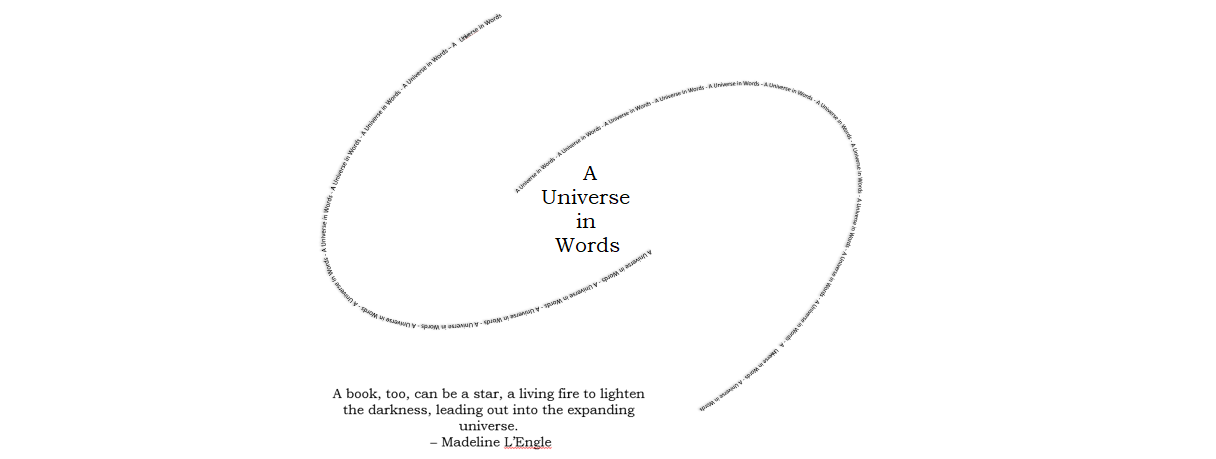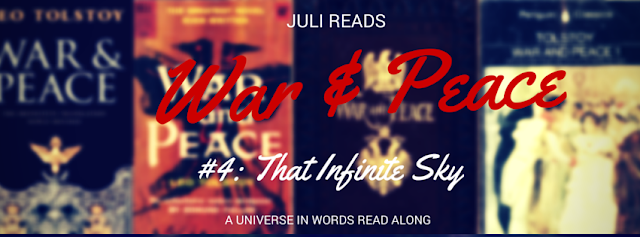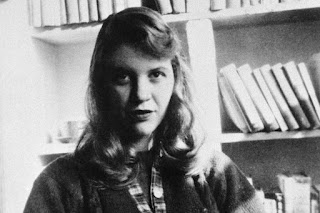War & Peace #4: I.iii.13 - I.vi.7
I didn't actually manage to get to twenty chapters this week but didn't want to leave you hanging quite so early on in the War & Peace read along! On the one hand there have been some exciting development in the story which are mainly based on miscommunication and misunderstanding. But already, 240 pages in, some character have gotten absolutely sick of each other. Due to the wide variety of characters it's also really easy for the reader to pick favourites while disliking other characters. Unfortunately that has also happened to me but I feel very justified in my choice of favourites.
Summary of the Chapters:
Tolstoy is still happily moving between the various battlefields in Austria and the "homestead". Even if that homestead is at various different places. Anyways, this week we got to actually see one of my favourite historical figures: Napoleon Bonaparte! I was always impressed by him but ever since reading Les Mis and now reading about him here simply shows exactly how influential Napoleon has been for continental Europe/Eurasia. In the case of War & Peace so far, he has been kicking the Russian Army;s ass, but almost by accident. There is a lot of frustration happening and in the end the Russians are definitely defeated. Even worse, Prince Andrew was hit by a canon, is wounded and has been captured by Napoleon himself. At least Dolokhov has been doing well for himself.
Then we move on to Book iv and watch Nicholas, who while at the front developed a patriotic crush on his Tsar, return home to his enraptured family. He goes right back to being his slightly insufferable self while, shock, horror, Prince Andrew is suspected to be dead! In further news, Nicholas' father throws a party for his regiment leader to which Pierre is also invited. And this is where the drama truly happens because rumours have been swirling that his wife Helen Vasili has been having an affair with Dolokhov, who has just become friends with Nicholas and is hence also at the party. Everything escalates and Pierre and Dolokhov meet in a duel, where, to everyone's surprise, Pierre manages to shoot Dolokhov. So far I'm assuming that the latter is dying, but I'm not sure yet. This also culminates in Pierre blaming Helene for him being "tricked" into their marriage and threatening to divorce her. The seventh chapter ends with Pierre leaving Moscow for St. Petersburg.
Feel of the Chapters:
It is interesting how the chapters set at the front are very active, very hectic, with loads happening almost all the time. There is a whole variety of characters that we know at least by name and they are constantly running around, seeing each other, fighting, getting ready to fight, etc. In contrast, the scenes at home are very quiet and almost solitary. There is almost always company, but I think almost all the characters feel quite alone in the way the men at the front don't. And of course there is a gender divide, of course, with the women stuck in domestic confinement. It sort of reminds me of the stillness and quietness which Jane Austen makes so prevalent in all her novels. It is what triggers a lot of her plots, the fact people are sat around with nothing to do for so much time that they end up becoming frustrated etc.
As such it is no surprise, then, that the last few chapters feel a little bit like a soap opera, where no one is actually talking, everyone is gossiping and people seem to die for no good reason. I think the gender politics here are quite interesting. Since it is mainly men who are given time by the narrator to talk about their feelings, Helene is naturally painted as the villain. She is callous, harsh and way too attractive so of course she is out of order. I'm sort of holding back on judging her since I don't actually know to what extent she was used by two men to have a fight or actually a guilty party. I'm interested to see how this story develops though!
General Points:
Summary of the Chapters:
Tolstoy is still happily moving between the various battlefields in Austria and the "homestead". Even if that homestead is at various different places. Anyways, this week we got to actually see one of my favourite historical figures: Napoleon Bonaparte! I was always impressed by him but ever since reading Les Mis and now reading about him here simply shows exactly how influential Napoleon has been for continental Europe/Eurasia. In the case of War & Peace so far, he has been kicking the Russian Army;s ass, but almost by accident. There is a lot of frustration happening and in the end the Russians are definitely defeated. Even worse, Prince Andrew was hit by a canon, is wounded and has been captured by Napoleon himself. At least Dolokhov has been doing well for himself.
Then we move on to Book iv and watch Nicholas, who while at the front developed a patriotic crush on his Tsar, return home to his enraptured family. He goes right back to being his slightly insufferable self while, shock, horror, Prince Andrew is suspected to be dead! In further news, Nicholas' father throws a party for his regiment leader to which Pierre is also invited. And this is where the drama truly happens because rumours have been swirling that his wife Helen Vasili has been having an affair with Dolokhov, who has just become friends with Nicholas and is hence also at the party. Everything escalates and Pierre and Dolokhov meet in a duel, where, to everyone's surprise, Pierre manages to shoot Dolokhov. So far I'm assuming that the latter is dying, but I'm not sure yet. This also culminates in Pierre blaming Helene for him being "tricked" into their marriage and threatening to divorce her. The seventh chapter ends with Pierre leaving Moscow for St. Petersburg.
Feel of the Chapters:
It is interesting how the chapters set at the front are very active, very hectic, with loads happening almost all the time. There is a whole variety of characters that we know at least by name and they are constantly running around, seeing each other, fighting, getting ready to fight, etc. In contrast, the scenes at home are very quiet and almost solitary. There is almost always company, but I think almost all the characters feel quite alone in the way the men at the front don't. And of course there is a gender divide, of course, with the women stuck in domestic confinement. It sort of reminds me of the stillness and quietness which Jane Austen makes so prevalent in all her novels. It is what triggers a lot of her plots, the fact people are sat around with nothing to do for so much time that they end up becoming frustrated etc.
As such it is no surprise, then, that the last few chapters feel a little bit like a soap opera, where no one is actually talking, everyone is gossiping and people seem to die for no good reason. I think the gender politics here are quite interesting. Since it is mainly men who are given time by the narrator to talk about their feelings, Helene is naturally painted as the villain. She is callous, harsh and way too attractive so of course she is out of order. I'm sort of holding back on judging her since I don't actually know to what extent she was used by two men to have a fight or actually a guilty party. I'm interested to see how this story develops though!
General Points:
- Tolstoy always refers to the Russian army as 'we' and 'us' which makes War and Peace feel a lot more nationalistic but without the negative sense. It's clear that Tolstoy is proud of his country and what they do, even when, in this case, they're losing against Napoleon.
- I think I'm starting to dislike Nicholas a bit. Initially I put the fact I couldn't really empathise with him down to that he's still growing etc. but now I just feel like he's a little bit entitled and proud of himself. See the first quote in the Quotes section below to see what I mean. Maybe my opinion will change but probably not.
- There is something odd about how childlike Natasha remains while everyone else seems to grow up way to quickly. Whereas Sonya already seems slightly aware of adult behaviour etc. but in a teenage way, Natasha is happily still running around, spurning marriage and laughing at everything. I sort of love her for it and also have an impending sense of doom that it is not going to end well. I mean, it is a Russian novel.
- I wonder when people are going to find out Prince Andrew isn't dead. It seems to be a given to people, but no one, so far, seems to be very upset about it. I'm assuming next week's chapters will bring us to his family and then we'll see some mourning but it is an interesting look into what consequences warfare had for the home front back in the day. Misinformation was rule, basically.
Quotes:
'How was it I did not see that lofty sky before? And how happy I am to have found it at last! Yes! All is vanity, all falsehood, except that infinite sky.' p.217
This is what Prince Andrew thinks moments after he's been hit by a canon and finds a moment of quiet reflection. He has been chasing after honour and recognition pretty much since page 1 and now he's finding some kind of peace in the sky. I thought it was beautiful!
'Besides it seemed to him [Nicholas] that the society of women was rather derogatory to his manhood.' p.234
You know what is derogatory to your manhood, Nicholas? That kind of attitude! Park it and take a seat, you're not that amazing yet. Ok, maybe that response is a little bit over the top, but Nicholas is definitely not my favourite character right now.
'Rostov went on ahead to do what was asked, and to his great surprise learned that Dolokhov the brawler, Dolokhov the bully, live din Moscow with an old mother and a hunchback sister, and was the most affectionate of sons and brothers.' p.245
I liked this little moment because it showed that Tolstoy can be quite gentle with his characters as well. Dolokhov was a major idiot in these chapters and yet Tolstoy showed us that we've only seen one side of him. Everyone behaves differently depending on where they are and in Dolokhov's case it turns out he can be good to some people.




Comments
Post a Comment